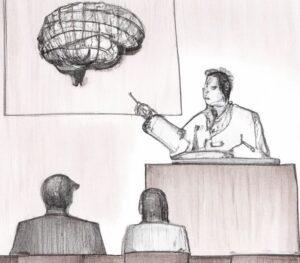Background
In 1885, Charles Parker was a brakeman for the Baltimore & Ohio Railroad Company. His job involved riding on top of freight cars and applying the brakes to slow or stop the train. On one occasion, Parker was riding on top of a car when he was struck in the head by a low bridge, causing him to fall and suffer a traumatic brain injury (TBI).
Legal proceedings
Parker sued the Baltimore & Ohio Railroad Company for damages, arguing that they had failed to provide him with a safe working environment. The railroad company argued that they were not responsible for Parker’s injuries because the accident was caused by a “purely fortuitous” event and because Parker was aware of the risks of his job. The case eventually went to trial, and a jury found in favor of Parker, awarding him $20,000 in damages.
Legal precedent
The Parker case helped establish the legal framework for workers’ compensation laws in the United States. The court ruled that employers have a duty to provide a reasonably safe working environment for their employees and that they can be held liable for injuries that result from their failure to do so. This principle has been codified in various workers’ compensation laws and regulations across the United States. This case resulted in important legal precedents that still impact the workers’ compensation system today.
Impact
The Parker case had a significant impact on the way employers are held accountable for work-related injuries and illnesses in the United States. It helped establish the principle of “common law negligence,” which holds that employers have a duty to provide a safe working environment and that they can be held liable for injuries that result from their failure to do so. The case also helped pave the way for the development of workers’ compensation laws, which provide benefits to injured workers without requiring them to prove fault on the part of their employer.
The plaintiff, Parker, was a railroad worker who suffered a head injury when he was hit by a heavy object while working. The accident resulted in a traumatic brain injury that caused permanent damage to his cognitive abilities, personality, and overall quality of life.
At the time of the incident, workers’ compensation laws were not as comprehensive as they are today, and there was no clear legal framework for compensating workers who suffered traumatic brain injuries. The railroad company initially denied Parker’s claim for workers’ compensation benefits, arguing that his injury was not work-related.
However, Parker’s legal team successfully argued that the injury was indeed work-related and that he was entitled to workers’ compensation benefits. This case set a precedent that established that workers who suffer traumatic brain injuries while on the job are entitled to compensation benefits.
The Parker case also helped shape workers’ compensation laws by establishing that employers have a responsibility to provide a safe work environment for their employees. This includes providing appropriate safety equipment and taking reasonable precautions to prevent workplace injuries. If an employer fails to take these steps and a worker suffers a Traumatic Brain Injury (TBI); as a result, the employer can be held liable for damages.
In addition, the Parker case established that workers’ compensation benefits for traumatic brain injuries should include medical expenses, lost wages, and compensation for permanent disability or disfigurement. This precedent ensured that workers who suffered TBIs would receive fair compensation for the losses they suffered.
Overall, the Parker v. Baltimore & Ohio Railroad Co. case was a significant milestone in the development of workers’ compensation laws related to traumatic brain injuries. The case established clear legal precedents that continue to shape the workers’ compensation system in the United States today, ensuring that workers who suffer TBIs receive fair compensation for their injuries.






